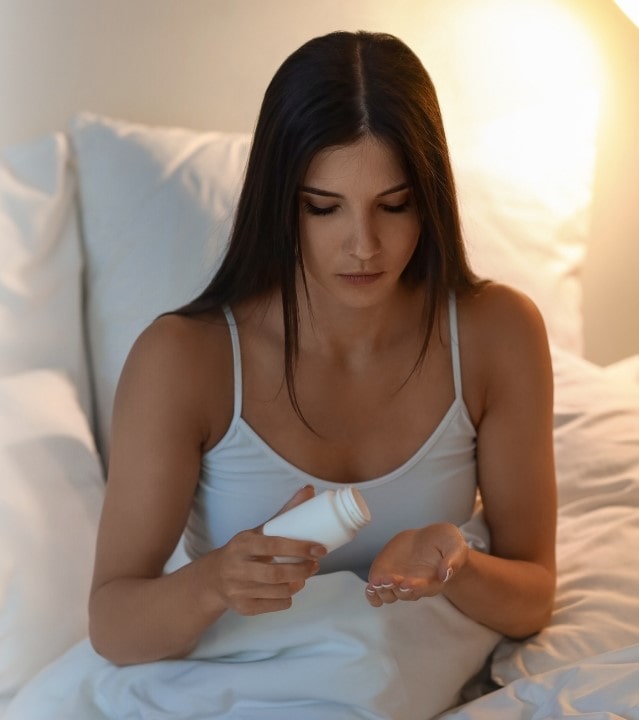Viagra, a well-known medication used to treat Erectile Dysfunction (ED) in men, has become synonymous with male sexual health. However, there’s curiosity and speculation about what happens if a woman takes Viagra. In this blog, we’ll delve into this question exploring the potential effects, and safety considerations.
Is there Viagra for women?

There isn’t a medication specifically equivalent to Viagra for women. While Viagra (Sildenafil Citrate) and similar medications like Cialis (Tadalafil) are FDA-approved for treating erectile dysfunction in men, there isn’t an equivalent medication approved for treating female sexual dysfunction.
However, there are ongoing efforts to develop medications to address female sexual dysfunction, including hypoactive sexual desire disorder (HSDD), arousal disorders, and other conditions.
Some medications, such as Flibanserin (Addyi) and Bremelanotide (Vyleesi), have been approved by the FDA for the treatment of HSDD in premenopausal women. These medications work differently from Viagra, targeting neurotransmitters and hormones involved in sexual desire and arousal rather than directly increasing blood flow to the genital area.
It’s essential for women experiencing sexual difficulties to consult healthcare providers for proper evaluation and discuss potential treatment options. Healthcare providers can provide individualized recommendations based on the patient’s specific symptoms, medical history, and preferences. Additionally, ongoing research is needed to understand female sexual dysfunction better and develop safe and effective treatments.
Does Viagra work for women?

The effectiveness of Viagra in women is a subject of ongoing debate and research. Viagra is primarily indicated for the treatment of erectile dysfunction (ED) in men, and it works by increasing blood flow to the penis, which facilitates erections.
However, the physiological mechanisms underlying male and female sexual arousal differ, leading to questions about whether Viagra can effectively address female sexual dysfunction.
Some studies have explored the use of Viagra in women with various sexual dysfunctions, including arousal disorder and difficulty achieving orgasm. While some women have reported improvements in sexual function and satisfaction when taking Viagra, the evidence for its efficacy in women is mixed and less robust compared to its well-established benefits in men with ED. It hence clears doubts about What happens if a woman takes Viagra.
Key Points:
- Limited Efficacy Evidence: Research on the use of Viagra in women has produced conflicting results, with some studies suggesting modest improvements in sexual function, arousal, and satisfaction, while others have found no significant benefits.
- Off-Label Use: Viagra is not approved for use in women by regulatory agencies like the FDA. Its use in women is considered off-label, meaning it’s prescribed for conditions other than those approved by regulatory authorities.
- Safety Considerations: The safety profile of Viagra in women, especially in the long term, is not well-established. Women may experience side effects similar to those observed in men, including headaches, flushing, nasal congestion, and gastrointestinal upset.
- Individual Variability: Female sexual function is influenced by multiple factors, including psychological, hormonal, and interpersonal factors. Responses to Viagra may vary among women based on these individual factors.
- Need for Further Research: There is a need for more extensive and rigorous research to better understand the potential benefits and risks of Viagra in women. Future studies should focus on clarifying the mechanisms of action, identifying appropriate dosages, and evaluating long-term safety and efficacy.
In summary, while some women may report positive experiences with Viagra for improving sexual function, its effectiveness in women remains uncertain. Women experiencing sexual difficulties should consult healthcare providers for proper evaluation and discuss appropriate treatment options tailored to their individual needs.
How does Viagra work for a woman?

Viagra primarily works by increasing blood flow to the penis in men, which helps facilitate erections. But the question of the hour: What happens if a woman takes Viagra?
Its mechanism of action in women is less straightforward due to differences in male and female sexual anatomy and physiology. While Viagra is not FDA-approved for use in women, some studies have explored its potential effects on female sexual function, particularly in women with sexual arousal disorders or difficulties.
The proposed mechanisms by which Viagra may exert its effects in women include:
- Increased Blood Flow: Like in men, Viagra may increase blood flow to the genital area in women, leading to enhanced engorgement of genital tissues and improved sensitivity to sexual stimulation. This increased blood flow could potentially enhance arousal and sexual pleasure.
- Sensory Enhancement: Viagra may have direct effects on sensory nerve endings in the genital area, enhancing sensations and pleasure during sexual activity.
- Psychological Factors: Sexual arousal and satisfaction are influenced by both physiological and psychological factors. In some cases, the knowledge or belief that one is taking a medication to enhance sexual function may have placebo-like effects, leading to improvements in arousal and sexual satisfaction.
It’s important to note that the efficacy and safety of Viagra in women are not well-established, and its use in women is considered off-label.
What happens if a woman takes Viagra?

While Viagra is not approved for use in women by regulatory agencies like the FDA, some women have experimented with the medication for various reasons, including enhancing sexual pleasure or treating sexual dysfunction.
Here’s a breakdown of potential effects and what happens if a woman takes Viagra:
- Increased Blood Flow: Like in men, Viagra may increase blood flow to the genital area in women, potentially leading to enhanced arousal and sensation.
- Limited Efficacy: Studies investigating the use of Viagra in women have yielded mixed results. Some research suggests that Viagra may have modest benefits in certain female sexual dysfunctions, such as arousal disorder or difficulty achieving orgasm. However, the evidence is not robust, and Viagra’s efficacy in women remains uncertain.
- Side Effects: Women who take Viagra may experience side effects similar to those observed in men, including headaches, flushing, nasal congestion, dizziness, and gastrointestinal upset. However, the incidence and severity of side effects in women may vary.
- Safety Concerns: The safety of Viagra in women, particularly in the long term, has not been adequately studied. There are concerns about potential risks and adverse effects, especially considering differences in female anatomy, hormonal profiles, and sexual response compared to men.
- Hormonal Considerations: Female sexual function is complex and influenced by various factors, including hormonal balance. Viagra’s effects on female hormones and reproductive health are not well understood and warrant further investigation.
Is it safe for a woman to take Viagra?

No, it is not safe for a woman to take Viagra as the safety of Viagra in women has not been well-established, as the medication is primarily indicated for the treatment of erectile dysfunction (ED) in men.
While some women may consider using Viagra off-label for various reasons, including enhancing sexual pleasure or addressing sexual dysfunction, it’s important to approach this with caution and under the guidance of a healthcare provider.
Here are some considerations regarding the safety of Viagra for women:
- Lack of FDA Approval: Viagra is not approved for use in women by regulatory agencies like the FDA. Its use in women is considered off-label, meaning it’s prescribed for conditions other than those approved by regulatory authorities.
- Limited Efficacy Evidence: Studies investigating the use of Viagra in women have produced conflicting results, with some suggesting modest improvements in sexual function, arousal, and satisfaction, while others have found no significant benefits. The evidence for its efficacy in women is not robust compared to its well-established benefits in men with ED.
- Potential Side Effects: Women who take Viagra may experience side effects similar to those observed in men, including headaches, flushing, nasal congestion, dizziness, and gastrointestinal upset. However, the incidence and severity of side effects in women may vary.
- Safety Concerns: There are concerns about the safety of Viagra in women, especially in the long term. Given the differences in female anatomy, hormonal profiles, and sexual response compared to men, the effects of Viagra on women’s health and reproductive system are not well-understood and warrant further investigation.
- Alternative Treatment Options: Women experiencing sexual difficulties should consult healthcare providers for proper evaluation and discuss appropriate treatment options tailored to their individual needs. Healthcare providers can provide personalized advice and discuss alternative treatment options that are FDA-approved and supported by scientific evidence.
Endnote:
In conclusion, while some women may experiment with Viagra for perceived sexual benefits, its efficacy and safety in women remain unclear. Viagra is specifically designed to address male sexual dysfunction, and its use in women is off-label and not recommended without medical supervision. The question What happens if a woman takes Viagra is clear.
Women experiencing sexual difficulties should consult healthcare providers for appropriate evaluation and treatment options tailored to their needs. Additionally, ongoing research is needed to better understand the potential effects and risks associated with Viagra in women, emphasizing the importance of evidence-based approaches to sexual health and wellness.
FAQs:
Does Viagra make women horny?
No, Viagra (Sildenafil Citrate) is not specifically designed to increase sexual desire or libido in either men or women. Instead, Viagra works by increasing blood flow to the genital area, which can facilitate arousal and enhance sexual performance in men with erectile dysfunction (ED). However, its effects on sexual desire or arousal in women are less clear and not well-understood.
Can you take female Viagra while pregnant?
It’s crucial to emphasize that there isn’t a medication specifically known as “female Viagra.” While medications like Viagra are approved for treating erectile dysfunction in men, there isn’t an equivalent medication approved for use in women by regulatory agencies like the FDA, What happens if a woman takes Viagra? Some women may inquire about using medications like Viagra, off-label to address sexual concerns during pregnancy. In general, it’s essential to exercise caution and consult with a healthcare provider before taking any medication, especially during pregnancy.
Is there a female Viagra over-the-counter?
No, there isn’t a medication specifically known as “female Viagra” available over-the-counter (OTC). While medications like Viagra (sildenafil citrate) are approved for treating erectile dysfunction in men, there isn’t an equivalent medication approved for use in women by regulatory agencies like the FDA.
Is Tamsulosin like Viagra?
No. Tamsulosin is used for Benign Prostatic Hyperplasia (BPH). While both medications may affect blood flow in different parts of the body, they are not interchangeable and are used to treat entirely different conditions. Tamsulosin is not indicated for the treatment of Erectile Dysfunction (ED), and Viagra is not indicated for the treatment of Benign Prostatic Hyperplasia (BPH). Each medication is prescribed based on the specific condition being treated and the individual patient’s needs.
What happens if a woman takes Viagra or Cialis?
It may result in increased blood flow to the genitalia in women who take it. That could improve orgasmic function, arousal, and sensitivity. Research on its efficacy in females has yielded inconsistent findings. However, the evidence for the efficacy of Viagra or Cialis in women is mixed and not well-established compared to their benefits in men.


